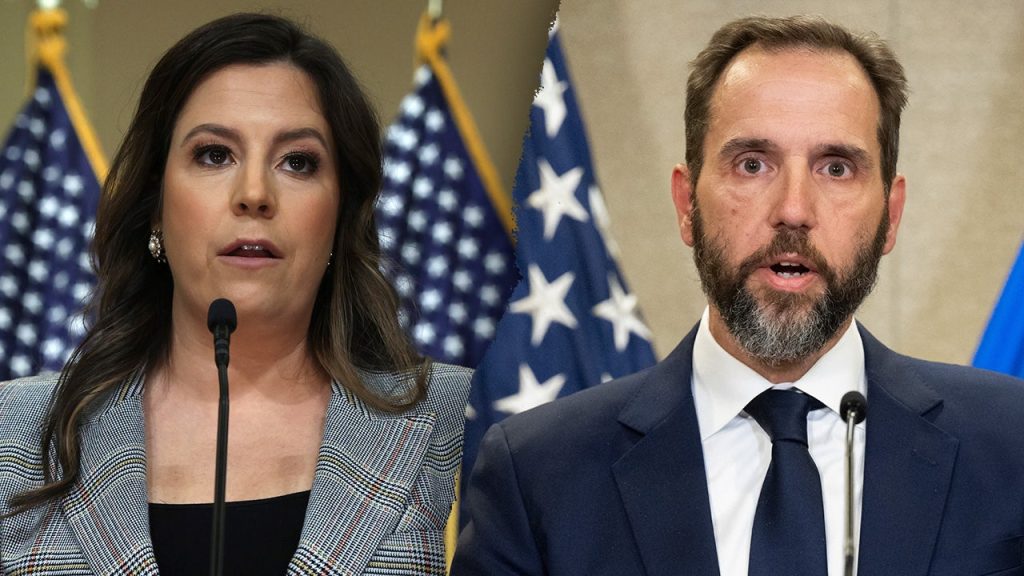House GOP Conference Chair Elise Stefanik, a Republican from New York, is filing an ethics complaint against special counsel Jack Smith on Tuesday, accusing him of violating Department of Justice (DOJ) standards and trying to influence the 2024 presidential election against former President Trump. Stefanik sent a letter to the DOJ’s Office of Professional Responsibility, urging the government watchdog to investigate Smith for allegedly abusing federal resources to interfere with the election. She accused Smith of attempting to rush the trial of the federal January 6th case against Trump, in violation of Justice Department policy and the United States District Court for the District of Columbia’s stay of proceedings.
Smith’s case against Trump, based on allegations of attempting to overturn the 2020 election, was scheduled for trial in March but has been delayed as the Supreme Court deliberates Trump’s claim of immunity from criminal prosecution for actions taken during his presidency. Stefanik’s complaint alleges that Smith first tried to influence the election in August 2023 by petitioning for a Jan. 2, 2024 trial date. She argued that the complexity of the case, with millions of pages of discovery and thousands of hours of camera footage, would normally require a longer preparation time, and that Smith’s push for an early trial was intended to influence the November election, in violation of Justice Department policy.
Stefanik also cited Smith’s multiple petitions to the Supreme Court and his statements in court that no one is above the law as further evidence of his misconduct. She suggested that an ethics investigation into Smith’s conduct is warranted, given the potential violations of DOJ policy and professional conduct rules. Stefanik characterized Smith’s actions as partisan attempts to sway the 2024 election results by expediting the trial and disregarding court orders. The Supreme Court, which has a conservative majority, is expected to rule on Trump’s immunity case in June, with the likelihood of a trial before the election being slim.
The complaint filed by Stefanik against Smith highlights the contentious legal battle surrounding Trump’s alleged attempts to overturn the 2020 election results. The accusations of Smith’s improper conduct and partisan motivations further intensify the political and legal challenges faced by both the Trump administration and the Justice Department. The ongoing Supreme Court deliberations on Trump’s immunity claim add another layer of complexity to the case, with potential implications for the upcoming presidential election. The outcome of these legal proceedings will likely have significant ramifications for both Trump and the broader political landscape.
Stefanik’s complaint underscores the deep divisions and partisan tensions within the Justice Department and the broader political sphere. The allegations of Smith’s unlawful interference in the election process and violation of ethical standards raise questions about the integrity of the legal system and the principles of justice. The accusations of misconduct against a high-ranking special counsel further fuel the already heated debates surrounding accountability and transparency in government institutions. The outcome of the ethics investigation and the Supreme Court’s ruling on Trump’s immunity will be closely watched by stakeholders on all sides of the political spectrum.
The clash between House GOP Conference Chair Elise Stefanik and special counsel Jack Smith over allegations of improper conduct and partisan motivations highlights the challenges of navigating legal and political minefields in a polarized environment. The outcome of the ethics complaint and the Supreme Court’s decision on Trump’s immunity claim will have far-reaching implications for the administration of justice, the integrity of government institutions, and the dynamics of the upcoming presidential election. The accusations and counter-accusations between the Republican lawmaker and the special counsel encapsulate the heightened tensions and high stakes in the ongoing legal battles over Trump’s actions during his presidency. The resolution of these legal disputes will shape the political landscape and set precedents for future interactions between elected officials and legal authorities.















